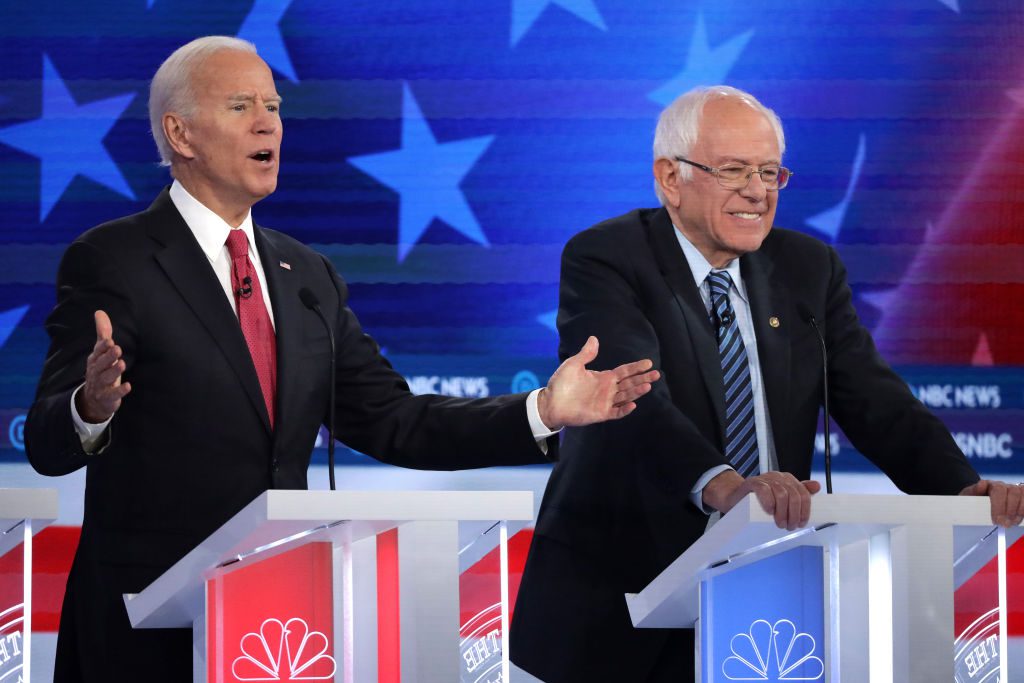In Search of That Left-Wing Antiwar Flame

Last night’s Democratic debate was whiter than a Simple Plan concert in a snowstorm. And while no one mourned the loss of Kamala Harris’s boring one-liners or Cory Booker’s “gosh golly gee, let’s build a monorail!” hypomania, Tulsi Gabbard’s presence was sorely missed. With President Trump banging the drums against Iran, the need for an authentic and consistent antiwar candidate is more palpable than ever. As Matt McDonald recently wrote at the Spectator USA, “Most voters don’t want war. Is there time in the Democratic primary process for Tulsi to prove that?”
The answer is that she may not need to. Following the Soleimani assassination, most of the Democrats seem to be gravitating in her direction.
To be sure, none of the candidates at the debate last night went as far as Tulsi would have. There was no trashing of neoconservatives and neoliberals alike; no coronation of Hillary Clinton as the “queen of warmongers.” Still, the tenor of the event was fairly antiwar. The first five minutes were a footrace between Bernie and Biden to see who could most distance himself from the Iraq war, with Bernie calling the invasion “the worst foreign policy blunder in the modern history of this country” and Biden regretting his 2003 vote for it. Elizabeth Warren went on a great tirade against the “revolving door” between the Pentagon and the defense industry. Bernie later declared that the Afghanistan and Iraq occupations had been based on lies (Libya, for some reason, was conveniently overlooked).
It was the two women onstage who assumed the poles of Democratic foreign policy opinion. Amy Klobuchar pledged to withdraw some though not all American troops from the Middle East (she opposed Trump’s Syria “pullout”), while Warren said we need to leave completely. Pete Buttigieg wasn’t especially impressive, frantically tying every issue back to his own military service as he tried to overcome the perception that he’s inexperienced. But even he had a good answer on Congress’s role in approving wars, calling out Biden for the Obama administration’s stretching the post-9/11 AUMF into jelly. The Iran deal was broadly supported. Multilateralism was hear-heared.
It says something that some hawks are now hanging their hats on Buttigieg. Over at The Bulwark, Shay Khatiri teases that the South Bend mayor may secretly be a neocon:
Buttigieg is not Paul Wolfowitz. But on the foreign policy spectrum, with John Kerry on one side and Wolfowitz on the other, he is positioning himself closer to the Wolf’s end of things.
One of the many opportunities with Donald Trump’s presidency has gifted to Democrats is the chance to take back the mantle of muscular foreign policy, human rights, and the promotion of American values. And Buttigieg is drawing the party a road map.
Uh-huh. Buttigieg is certainly at the more hawkish wing of the current Democratic spread—Khatiri notes that he’s called Venezuela’s Nicolás Maduro a dictator and criticized the Chinese Communist Party for its human rights violations—but these days that isn’t saying all that much. And Buttigieg is hardly leaning away from a lily-livered John Kerry; more like John “Reporting for Duty” Kerry looks like a bloodshot warmonger next to Buttigieg and the other Democrats. Between Kerry’s candidacy and today’s primary contenders lie miles of difficult national self-examination and acknowledgement: nation-building didn’t work, Iraq was a cataclysmic failure, unilateralism is a pretty poor idea. Buttigieg might be hawkish-ish, he might not have internalized all those lessons, but he still lives in a post-Bush world.
Whether all this means the left is rekindling a little of its mid-aughts anti-war flame has yet to be seen. There’s still the matter of Russia, on which even the progressives can sound like bomb-throwers. Ultimately the Democratic Party is far more anti-Trump than it is anti-war, and political tribalism is a fickle means of carving out principled positions. Still, the Democrats last night made a case for a saner and more realistic foreign policy. Which ones would actually follow through if elected? If history is any indication, probably all too few.
Comments